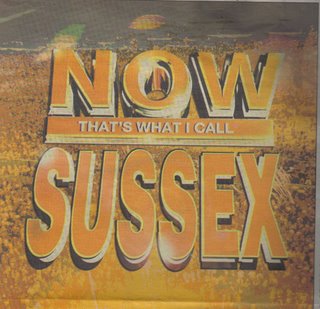 Nine months on from that glorious July 6 decision, and London's successful bid for the 2012 Olympics and Paralympics has now given birth to... the first official International Olympic Committee visit to make a check-up on our preparations.
Nine months on from that glorious July 6 decision, and London's successful bid for the 2012 Olympics and Paralympics has now given birth to... the first official International Olympic Committee visit to make a check-up on our preparations.The most fun I've had in my current, limited job was steering all our 2012 bid coverage, and especially trailing round behind IOC Evaluation Commission members on their tour of the Stratford scrublands and just-about-beyond in February last year.
I didn't bother to follow them up to the top floor of a Newham sheltered housing block today, having already enjoyed the view last time.
That was indeed an entertaining day.
The delegates had started that drizzy February Thursday driven by coach through the unprepossessing streets of Tower Hamlets and Newham.
Dingy brown-brick houses, sorry shops and rusty industrial outposts outnumbered the occasional flashes of colour, including an unlikely Porsche dealership.
But once they reached the top floor of the 20-storey sheltered accommodation block, Holden Point, the delegates could goggle over what would become London's 500-acre Olympic Park.
Coloured blimps perched above where the 80,000-seat Olympic Stadium, the Olympic Village for 17,000 athletes, and hockey, swimming and cycling arenas would grow.
The existing 'wastelandscape' of goods yards, unsightly university halls of residence and East End Blitz debris would be cleared for a thriving Olympic park, restocked River Lea and figure-of-eight railroad.
Okay, you needed a Jonathan Edwards-style leap of imagination to picture what it could - would - become by 2012, but it was - and will be - well worthwhile.
The finest piece of writing since joining my current paper was the lengthy, impassioned document I put together for my editor, desperately striving to convince him why I should be sent to Singapore for the July decision, but sadly our company finances didn't stretch quite deep enough.
Instead, I spent the day in Trafalgar Square, enjoying the tension while remaining convinced throughout we would get the nod.
Actually, amend that. I had bullishly believed all through the bid process that London could and would triumph, despite the all-surrounding scepticism. It was only on the Wednesday morning itself, as I awoke, that I suddenly thought: "Wait a minute - maybe we're not going to do this after all!"
Thankfully Jacques Rogge came out with what the following day's Guardian front-page wrongly described as: "One sweet word: London".
Not quite. It was, in fact: One sweet syllable - "Lon-", all that was needed to send the sardine-packed Trafalgar Square crowds somehow manouevring enough room to joyously punch the air.
Sadly, we weren't to know the following day's tragedy so sharply to taint the triumph. At the time, the only downside seemed to be the inevitable, incessant repeats of Heather Small's awful anthem, "Proud".
I still can't quite believe how five of the world's major, most glamorous and significant cities were all vying for the prize at the same time, anyway.
Surely there would have been a good case for all of London, Paris, Moscow, New York and Madrid being given the Games, sealing up five consecutive host cities in a row.
But then again, it was very odd seeing so much effort and expense being spent on sucking up to the creepy IOC itself, the closed-shop club which just can't lose - the host city does all the work, picks up all the tab, yet everyone fawns over the 117 magic members of this overarching elite.
As I wrote at the time, albeit-inevitably just failing to find space among the pieces I did get printed...
ONE has been jailed for plotting to kill his country's leader, another narrowly escaped jail for bribing his government with £600million.
One is on trial for allegedly taking thousands of pounds in political kickbacks - another led Idi Amin's murderous army in Uganda.
Several have survived being found guilty of corruption in one of sport's greatest scandals.
A few are international nobility, including a Crown Prince, a Grand Duke and our own Princess Royal.
And others are undisputed kings and queens of track and field, boasting a glittering haul of Olympic gold medals.
Yet all 117 members of this very motley crew will have all the importance of aristocracy to London's Olympic hopefuls.
For they make up the International Olympic Committee, who decide on July 6 which city will host the 2012 Summer Olympics.
The IOC nowadays is keen to be seen as cleaner than clean and expelled ten members who took bribes to back Salt Lake City's bid for the 2002 Winter Olympics.
New IOC president Jacques Rogge has since barred members from visiting candidate cities and was quick recently to stamp on London's offer of free flights for athletes.
But as London, Moscow, Madrid, Paris and New York spend millions fighting for the IOC's favour, it is worth considering how tainted the organisation remains.
Six members implicated in the Salt Lake affair are still on board, while another four have survived a similar investigation surrounding the 2000 Sydney Olympics.
Even post-Salt Lake, the IOC very nearly elected not Rogge, but a man now languishing in jail for embezzling £1.85million.
Helpful Salt Lake contacts put Un Yong Kim's son John Kim on the payroll of an American firm to get a green card, while the Berlin Philharmonic Orchestra organised rehearsals for his pianist daughter.
But ex-secret service head Kim was given 'the most severe of warnings' but stayed on the IOC until his forced resignation last month.
This came almost a year after he was given a two-and-a-half year sentence in South Korea for embezzling corporation donations to the World Taekwondo Federation.
Another South Korean, Samsung boss Kun Hee Lee, is still on the IOC despite a suspended sentence in 1996 as part of a group bribing the country's government with £600million.
The IOC similarly retained Lassana Palenfo, jailed for a year in July 2001 for plotting to kill Ivory Coast leader, General Robert Guei.
Another jailbird, Ivan Slavkov, at least is expected to be sacked next week for telling undercover Panorama reporters he could help 'buy' IOC members' votes.
The Bulgarian member was unable to make the 1993 vote on the 2000 Games because he was under house arrest on fraud and firearms charges.
He had also spent 44 days in prison on 1990 for illegal ownership of firearms and foreign currency, and missed the 1992 Barcelona Olympics after Bulgarian police seized his passport.
Sydney organiser John Coates admitted offering fellow IOC members Charles Mukora and Frances Nyangweso £19,000 each and free stays at London's Dorchester Hotel if they backed his city's bid.
Mukora was sacked from the IOC, Nyangweso reprieved - despite being the barbaric Idi Amin's defence chief throughout the 1970s.
Finnish member Peter Tallberg refused to quit despite all three of his sons receiving jobs in countries seeking to host the Games between 1996 and 2004.
Sydney also arranged a job interview for the son of Tunisia's Mohamed Mzali,
And Sydney was also forced to drop Australian member Phil Coles, who received holidays, ski lessons, equipment and Superbowl tickets from the Salt Lake organisers.
One letter from Salt Lake president Tom Welch even promised Coles: 'Fresh snow will be ordered for your forthcoming visit.'
The IOC ordered him off the Sydney organising committee and the Australian Olympic Committee - but kept him for themselves.
Other surviving members mired by Salt Lake include Holland's Anton Geesink, severely reprimanded after an academy bearing his name was paid £3,500.
Panama's Meliton Sanchez Rivas was caught red-handed when arrested for touting 300 tickets outside the main stadium of the Barcelona Olympics.
The IOC has also been shaky on drugs - independent inquiries have criticised Holland's Hein Verbruggen and Italy's Mario Pescante for covering up doping scandals in cycling and football, respectively.
And while France's IOC members will not vote unless or until Paris is eliminated, the country has been embarrassed by Guy Drut's trial for alleged fraud.
The former sports minister is one of 47 defendants accused of receiving kickbacks from contractors renovating schools in Paris.
And then there is Fifa president Sepp Blatter and his predecessor Joao Havelange, both immensely controversial football figures who have faced - and denied - widespread allegations of sleaze.
Yet for the next week or so, they are the 'special ones' who the candidate cities dare not criticise - explaining why Sebastian Coe was so quick to withdraw London's mild funding incentives.
Michael Liebreich, who represented Britain at the 1992 Winter Olympics, warned: 'There is nothing wrong with the idea of offering financial support to athletes from poorer countries. The problem is with the wider Olympic family, which contains some very unsavoury people indeed.
'The IOC are not people who look good under scrutiny. The Olympic movement will lurch from scandal to scandal until there is root-and-branch reform.'

